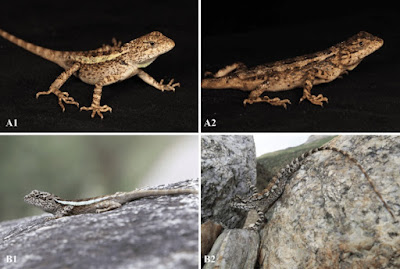 |
| Diploderma yangi Wang, Zhang & Li, 2022 |
Abstract
A new species of Diploderma is described from the upper Salween River Valley in eastern Tibet, China based on morphological and genetic data. The new species is morphologically most similar and phylogenetically closely related to D. laeviventre, but it can be easily diagnosed by having distinct conical scales on the post rictal region of the head, distinctively keeled ventral head and body scales, and different coloration of gular spots and dorsolateral stripes in both sexes. The taxonomic discovery further highlights the underestimated diversity of the genus and the importance of habitat conservation of the neglected hot-dry valley ecosystems in the Hengduan Mountain Region of China.
Key words: Cryptic diversity, Draconinae, IUCN, Lizard, Vulnerable
Diploderma yangi
Etymology. The new species name is derived from the last name of Chinese herpetologist, Dr. Datong Yang, from Kunming Institute of Zoology, Chinese Academy of Sciences. We name the new species after Dr. Yang in hon-oring his pioneer works and lifetime contributions to the herpetological research in the Hengduan Mountain Region in China. We suggested Zayu Mountain Dragon as its English common name, and 察隅龙蜥 (Pinyin: Chá Yú Lóng Xî) as its Chinese common name.
 |
| Habitat at the type locality of Diploderma yangi sp. nov. near Cawarong Village, Zayu County, Tibet, China. Photo by Xiaolong Liu. |
Kai Wang, Yinpeng Zhang and Xianqi Li. 2022. A New Species of Diploderma (Reptilia: Squamata: Agamidae) from the upper Salween River in Eastern Tibet, China. Zootaxa. 5099(2); 201-220. DOI: 10.11646/zootaxa.5099.2.3
